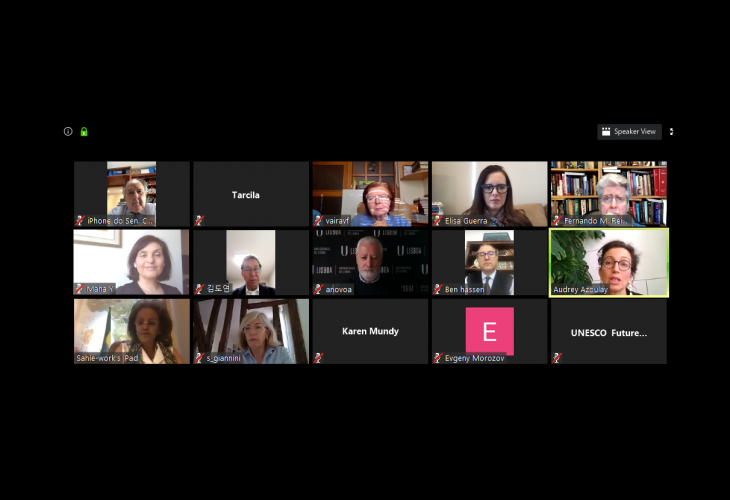International Commission releases Joint Statement on Education and the COVID-19 crisis

Protecting and Transforming Education for Shared Futures and Common Humanity
A Joint Statement on the COVID-19 Crisis
International Commission on the Futures of Education*
14 April 2020
A defining moment for our shared future
The tragedy of the COVID-19 health crisis is creating exceptional circumstances that are affecting billions of lives and causing massive economic, social, and educational disruptions. The multiple likely impacts of COVID-19 on individuals and societies mean there will not be a return to the world that existed before. As humanity looks for ways to transform the world for the better after the worst health crisis in a century, we must rethink social policies, including education, and address long-standing issues of structural inequality, poverty and exclusion. We have opportunities to strengthen global common goods, protect and advance public education, and put knowledge and learning in the service of alternative futures for humanity and the planet.
In recent decades educational opportunities around the globe have expanded significantly; much of this is now under grave threat. Schools and universities are closed in most countries, affecting over 90% of students globally. Even as learning continues in many ways, we are at a moment where massive efforts will be necessary to make sure the 2020s do not become a decade of lost opportunity.
The hope of public education in a transformed world
The current crisis is reminding us how crucial public education is in societies, communities, and in individual lives. We have been reminded that public education is a bulwark against inequality—and of the importance of schooling in enabling lives of dignity and purpose. As we seize this exceptional opportunity to transform the world, and as we reimagine the organization of our schools and learning environments, we will need to think about what we want to become. We will need to enact our values and visions in the institutions and learning communities we rebuild. We have arrived at a moment—however unexpectedly—where collectively revisiting the purposes of education has become imperative.
Prioritizing human solutions
In the renewal of education, human interaction and wellbeing must be given priority. Technology—particularly digital technology that enables communication, collaboration and learning across distance—is a formidable tool and potential source of innovation. Yet we should be increasingly concerned that a shift to remote on-line learning will exacerbate inequalities, not only in the Global South but even in the most well-resourced corners of the planet. We must ensure digitalization does not undermine privacy, free expression, informational self-determination or lead to abusive surveillance. It is an illusion to think that online learning is the way forward for all. Alongside recommitting to teachers, we should recognize and nurture the learning that occurs in families and communities. The current crisis has shown us that the commons can be expanded, that cultural common goods and public instruments like educational television and radio should be shared across national borders. In the final analysis educators, learners and their relationships must be at the core of reconstructing education after the disruptions of COVID 19.
Loss of learning and economic hardship
Students, families and education systems are now feeling the impact of the COVID-19 pandemic through school closures. Schools will reopen but the economic impact of the crisis means that significant disruptions are on the horizon. A global recession is likely to have drastic consequences for the funding of education and other public services as well as for individuals’ lives and livelihoods. During this time our shared commitments to the transformative power of education must be reinforced. Knowledge and learning are humanity’s greatest renewable resources and will be one of our greatest sources of resilience—however multiple mitigation strategies are needed to address the looming economic recession and dampen the effects it will have on learning. Governments and international organizations must coordinate efforts to ensure continuity of learning and protect domestic and international financing of education. Applying principles of redistributive justice, resources must be directed to those who have been hardest hit economically, socially and educationally.
Global cooperation and solidarity
While distance, isolation and separation are temporarily useful measures, the overall strategy to overcome this global pandemic and its effects must be based on global cooperation and solidarity. This means opening pathways for grassroots and civil society actors to work alongside governments; it means private sector and philanthropic involvement. However, even as we build these necessary coalitions, we must recall that around the planet COVID-19 is being addressed through social mobilization, through the engagement of individuals, families and communities in self-isolation and through mutual caring. This global health pandemic will not be defeated by health measures alone. It will be solved by building civic trust and strengthening international cooperation. It will be solved together through solidarity, empathy, and an appreciation of our common humanity.
____________________________
* Established in 2019 by the UNESCO Director-General as an independent commission chaired by President Sahle-Work Zewde of Ethiopia and charged with rethinking the role of education, learning and knowledge in light of predicted, possible and preferred futures, the International Commission on the Futures of Education met virtually on 8 April 2020 to reflect on the COVID-19 crisis and the deeper transformations that may be underway. One outcome of that meeting is this Joint Statement which provides broad education policy guidance and flags longer-term issues that the global education community must attend to.